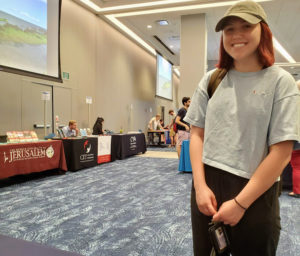Everybody’s main goal when going to college is to graduate with their degree but college offers opportunities you may not get after graduation, like study abroad. Studying abroad can seem like it will interfere with your academic trajectory, but it can actually advance your academic experience while being able to have a great experience in another country. Study abroad is a great academic aid that lets you study while getting real-life experience in your language or culture, while also helping you promote yourself by increasing self-responsibility and by expanding your career and research options.

Brochures for study abroad that pertain to my environmental science and Japanese majors that would help advance my academic experiences
My experience with studying Japanese language and culture has mostly been through a book and lectures. I’ve become very good at textbook conversations and vocabulary. Although I am experienced in these areas, the daily conversation between friends and acquaintances in Japan is not always the same. The dialogue or even tones can be different depending on who you’re talking to or where you are in Japan. Going abroad lets you get more real-life experience through conversations with those actually living in the country of your language or culture you’re studying. Not only do you get to practice your language and engulf yourself in that country’s culture, but by being in a foreign country, you are able to meet new people and see other perspectives that aren’t necessarily common in where you may be attending college.
Studying abroad also forces you to become more responsible for yourself. In college you may be distanced from your parents, which enables you to be more self-responsible, but you are still helped by other students and professors you may be close with. When you go abroad, you’re not going to have the same assistance that you’re used to. Even though it may seem like you’ve already become independent at college, abroad you’ll be responsible for tasks you haven’t been faced with. This will enable you to become more aware of your academic responsibilities, as well as advance your ability to succeed, at your home college and be able to figure out academic tasks without the aids you may have used in the past. It also gives you an opportunity to learn how to balance work and fun. Since you’re not only abroad to study, but to explore and learn about the culture and country itself, it is up to you to learn how to take advantage of both the academics and the experience.
At Emory, I have been exposed to new fields of studies and careers I did not even know existed before. Since Emory alone has an extensive amount of areas of studies that help expand your knowledge and guide you to find the area you want to have a career in, other countries must have many more. Even the U.S.A, as a whole, has a large range of jobs and research fields but if you look outside of the lens of your own country, the range gets even bigger. Going abroad lets you get a different perspective of the many job and research opportunities outside of the readily accessible ones already at your university. Going abroad also lets you look at careers where you are able to apply the knowledge gained from your language or culture studies.

Me at the Emory Study Abroad fair in September learning about the different offered experiences

